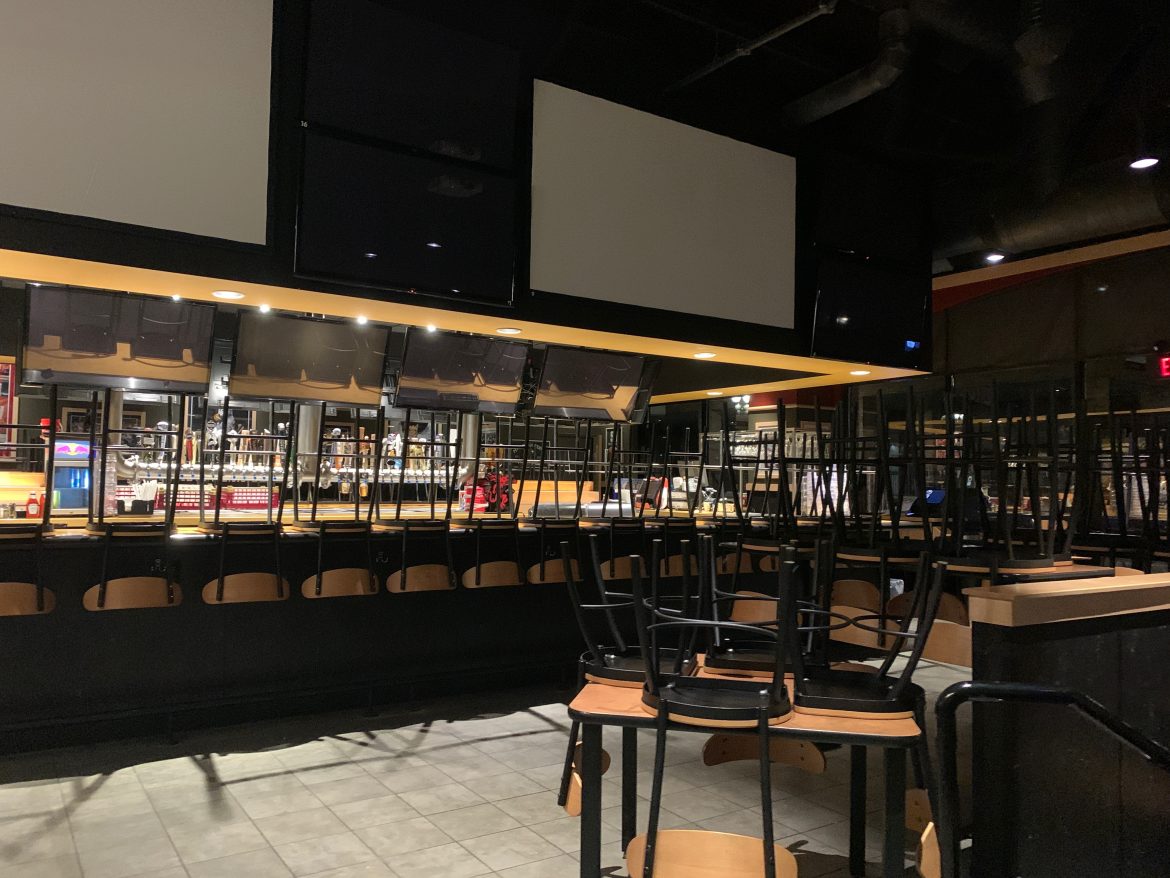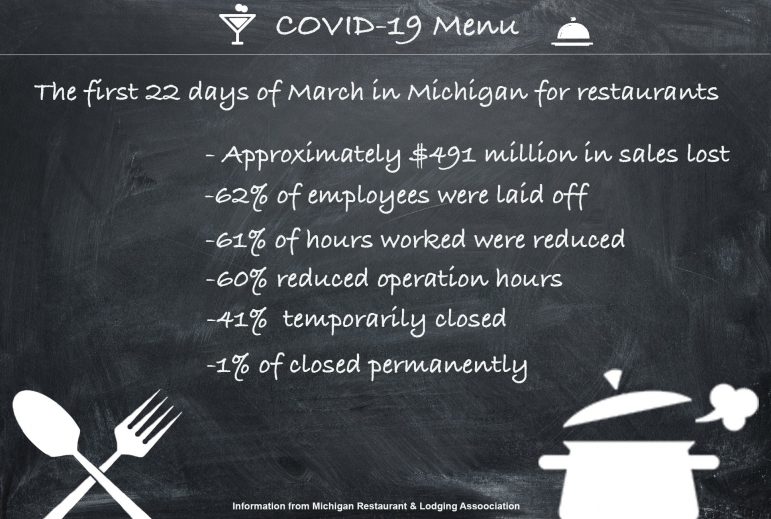Michigan restaurants don’t look as they used to before COVID-19. Gov. Gretchen Whitmer’s stay-at-home order leaves restaurants with only one option to continue the business, and that is through carry-out orders.
Without customers at their tables, hundreds of restaurants across the state have placed their employees on furlough. For the remaining few, hours have been shortened. Some have temporarily closed until the order is lifted. Some will never open again.
Portage, Michigan
At Red Lobster in Portage, Michigan, 17-year-old Sarah Sweers is a hostess who worked part time after school and on the weekends. The junior at Mattawan High School was told to not come into work the same day her school was shut down. A week later, she was placed on furlough.
“We heard from Tracy, our general manager, who heard it from corporate. So it was kind of like her relaying the message from corporate,” said Sweers.
Red Lobster bartender Jessica Leggett said that she thinks the reason they were placed on furlough was so the employees can qualify for unemployment.
“You have to be on furlough or be laid off, and you don’t lay off restaurant workers. There is no way to do that in the system,” said Leggett.
Sweers said that there is one person working in the kitchen, one manager working and then a to-go specialist.
Sweers just started high school online at Mattawan after a month of nothing and simply being quarantined at home. Leggett has been spending time with her highschool daughter, who recently resumed her schooling, and trying to keep herself busy.
“I go to the grocery store once a week. I watch a lot of TV. I’ve cleaned my apartment six times,” said Leggett.
As of now, Red Lobster plans to open again on May 31 to the public for dine-in. Sweers hopes that all will be well by then and that it will be back to business as usual.
Leggett, on the other hand, is doubtful.
“The majority of our customers are older, and if they won’t go out to eat, that will kill our base. I think this fall we will come back but not by this summer,” Leggett said.
She is worried about how she will make the money she used to, and thinks about searching for another job on the side.
“It’s a very financially stable job if you have customers. If you don’t have customers when bartending, then you’re not going to make any money,” Leggett said.
Leggett is sceptical about opening restaurants back up again, saying it is not possible to both social distance and conduct dine-in options during this quarantine.
“There is no way that restaurants can open up for anything other than to go until social distancing is over,” said Leggett. “Can you imagine trying to serve a table social distancing yourself? It’s not possible.”
Fenton, Michigan
Michigan State student Joie Britton went home to Fenton, Michigan, when all of her classes were moved online in early March. She hoped to make some money serving at The Barn, a bar restaurant, or the Ponemah Lakeside Lounge. Britton worked at these locations throughout the school year, coming back to her hometown and serving on some weekends to make some cash.
“The last day I worked was the 14th of March, and then on the 16th we were told that we were shut down,” Britton said.
Both locations are still doing takeout orders, however, they needed as few people as possible during this time of social distancing, leaving Britton furloughed.
Britton was planning on switching over to off-campus living in the fall instead of living in the dorms.
“It’s all up in the air, because I don’t know how I will be able to afford to live in the apartment, because I don’t know if we are going to be opening up this summer. If it weren’t for COVID, I would be going back to work full time starting next week.”
Britton is currently living with her boyfriend in his family cabin up north. She decided it was best because her father is over 60, and she was showing symptoms of COVID-19. There, she pays for her food, gas and more.
“I didn’t get unemployment, so then I applied for the new PUA that they are offering to people who didn’t qualify for unemployment. I applied for the $500 grant that MSU is offering, so I really hope I get those.”
Britton said she wishes for more aid to be provided to college students since there are very few options for people her age going through the same things she is. She hopes the quarantine will be over soon so she is able to visit her family from all across the nation and resume her normal life.
Monroe, Michigan
Like many college students, Grace Mikesell planned to return to her previous place of work in her hometown of Monroe, Michigan, this summer.
Mikesell is a junior at Loyola University in Chicago. She was looking forward to returning to Olga’s before discovering that the restaurant was only doing takeout orders for now. She is scared that it still could be the case when she is supposed to return.
“It will be very difficult. I’m a college student. Summers are my time to work and make money and if I can’t, then that will be very difficult for me,” said Mikesell. “So, I’m hoping that people are listening to the stay-at-home order so we can open up and get some normalcy again.”
Mikesell is studying nursing at Loyola. She said her family asked if she is now questioning that decision. Mikesell said the pandemic is making her want to do it more.
“I know that I’m one of the people that can be helping, and to not be able to be helping is heartbreaking,” said Mikesell. “But in a year I’ll be in that position and I’ll be able to make a change.”
East Lansing, Michigan
Student Kristy Kontowsky stayed at Michigan State to keep working at Buffalo Wild Wings when everyone else fled the campus. Kontowsky is a cashier, which can entail her working as a host or food expeditor. However, now that dine-in is closed down, it means that she is working on carrying out takeout orders.
“Takeout is busier than normal. They’re not coming in and sitting down to eat. Now, it’s a free-for-all,” said Kontowsky. “Just on to-go orders, we’ll be making about $12,000 a night just by selling wings to-go. It gets pretty insane.”
Since the dining room closed, the once-lively restaurant of wings and beer now holds only a couple cooks, managers and a cashier like Kontowsky.
“All the chairs are up everywhere, there’s not a single TV on, and there is no music playing ever, so it is silent until someone comes in the door,” Kontowsky said.
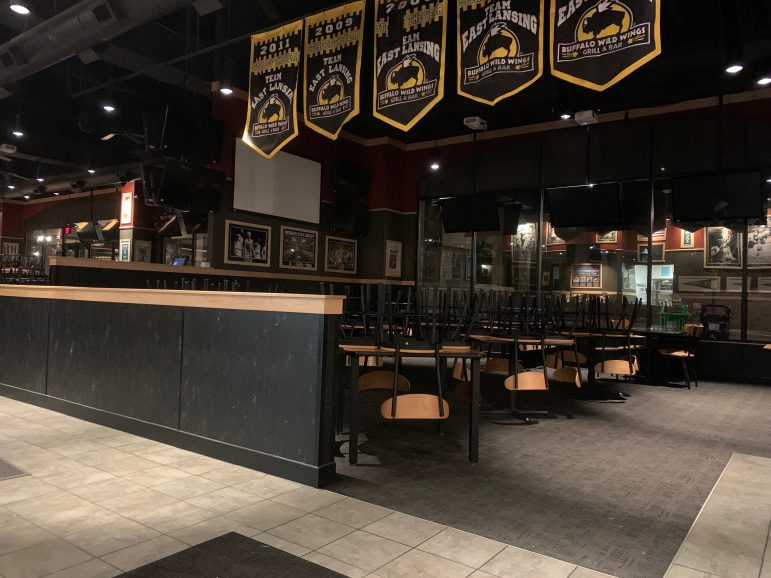
Kristy Kontowsky
Buffalo Wild Wings in East Lansing has closed down dine-in operations during the COVID-19 pandemic.She said that takeout has been successful, especially on Tuesdays and Thursdays when the restaurant has specials on wings. During these specials, the restaurant usually makes twice as much on takeout orders than it did on a regular day.
Buffalo Wild Wings is taking more precautions to protect against COVID-19. Kontowsky now has to wear a mask when communicating with people who walk through the door and takes her temperature before each shift. Every hour, no matter what she is doing, she has to stop what she is doing and wipe down any surface that could have become contaminated, whether that is a chair, door handle, counter and more. She has also started using a strong, industrial-strength cleaner that they have never had before.
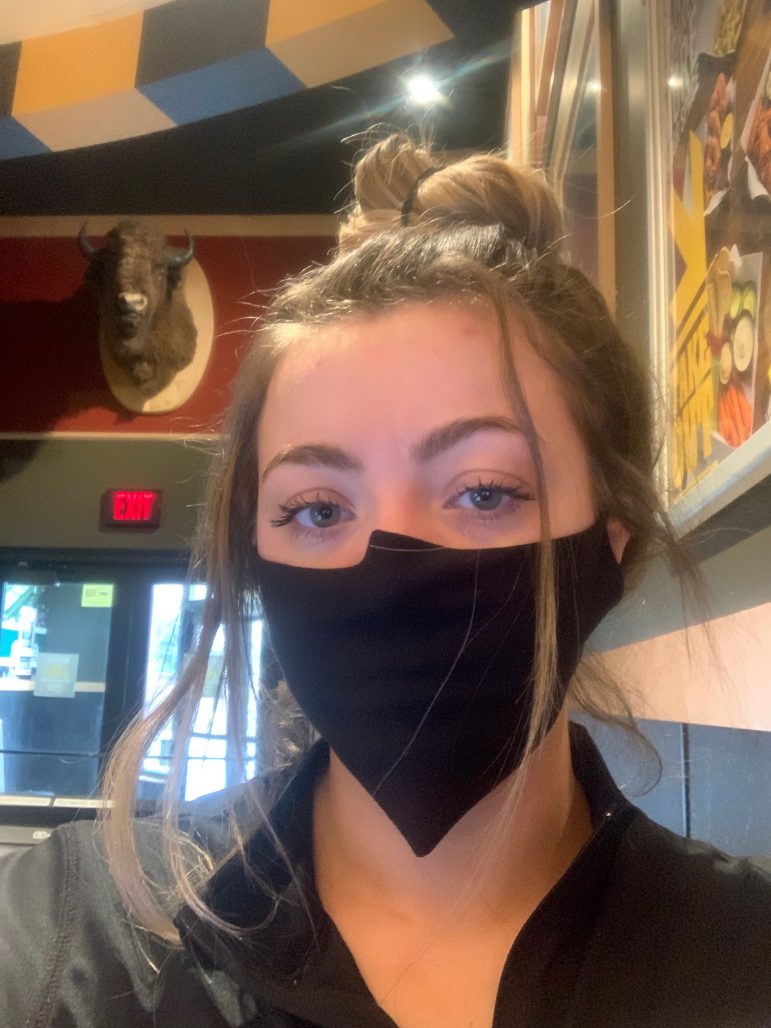
Kristy Kontowsky
Kristy Kontowsky and other Buffalo Wild Wings employees are required to wear masks when communicating with customers to prevent the spread of COVID-19.Kontowsky said she is making around the same amount of money as she was before, but it is now coming from a different source. Her hours have been significantly reduced, however, more people are beginning to give her tips.
“People very rarely tip on to-go orders,” said Kontowsky. “Now they are, and it’s making a huge difference to me.”
Kontowsky was supposed to be moved up to a serving position before the stay-at-home order. Now, there is no one to train her, and even if she was promoted, she would lose her new position temporarily. She is waiting for everything to go back to normal so she will have that opportunity to serve throughout the summer before returning to classes in the fall.
Brighton, Michigan
Owner of the Brighton Coffeehouse and Theater Amy McEwen Goller heard about both social distancing recommendations and the executive order through her customers.
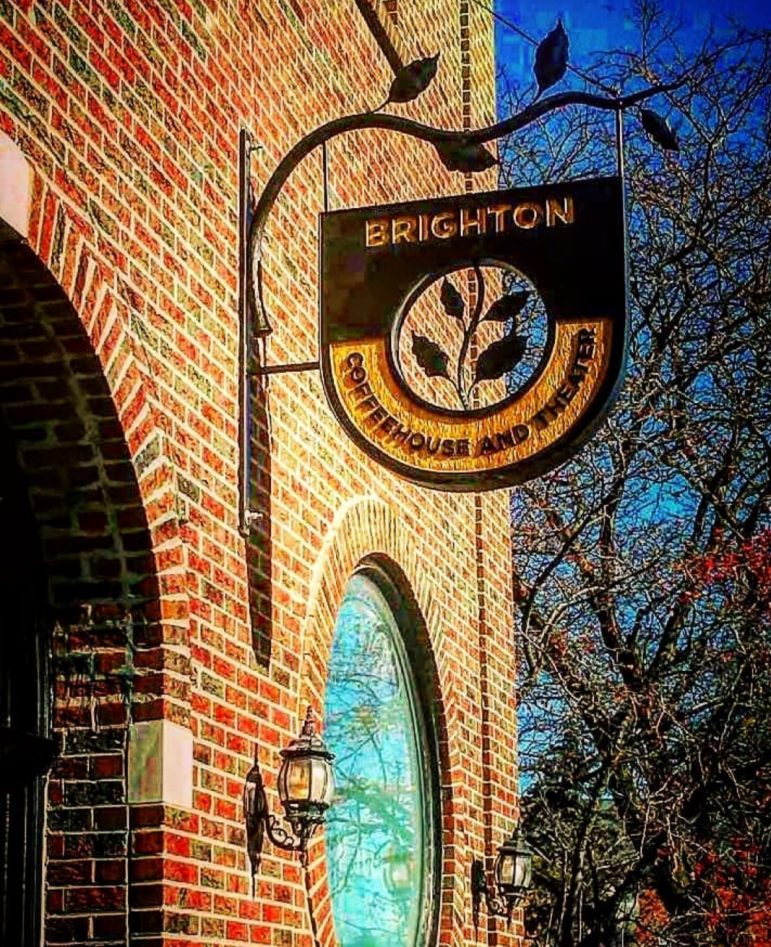
Amy McEwen Goller
The Brighton Coffeehouse and Theater in Brighton, MI.Although the coffeehouse is in its first year and a half of opening, McEwen Goller is not new to the business. She and her husband started the coffee franchise Espresso Royale, starting in East Lansing, Michigan before moving to Ann Arbor and other areas across the Midwest. They decided to open up their coffeeshop in Brighton to focus on one business and put their energy toward that.
“We’ve poured everything into it because we wanted one store of our own in our own town where our kids have gone to school. We are just amazed by the support we have gotten,” said McEwen Goller.
When the first order came out, the couple thought that they would have to close down their business. In response, they posted on social media that they were trying to get rid of everything they had. Customers rushed in and started to buy everything, even including the milk in their fridge.
“At the same time, we had customers messaging us at Facebook, DMing on Instagram, texting me and coming in and saying that they have found the one sentence in the order about essential businesses being able to stay open for carry-out,” said McEwen Goller.
Upon confirmation, they decided to stay partially open, allowing for takeout orders.
“Our numbers are significantly reduced,” said McEwen Goller. “We are doing about 20% of a typical day of what we were doing before.”
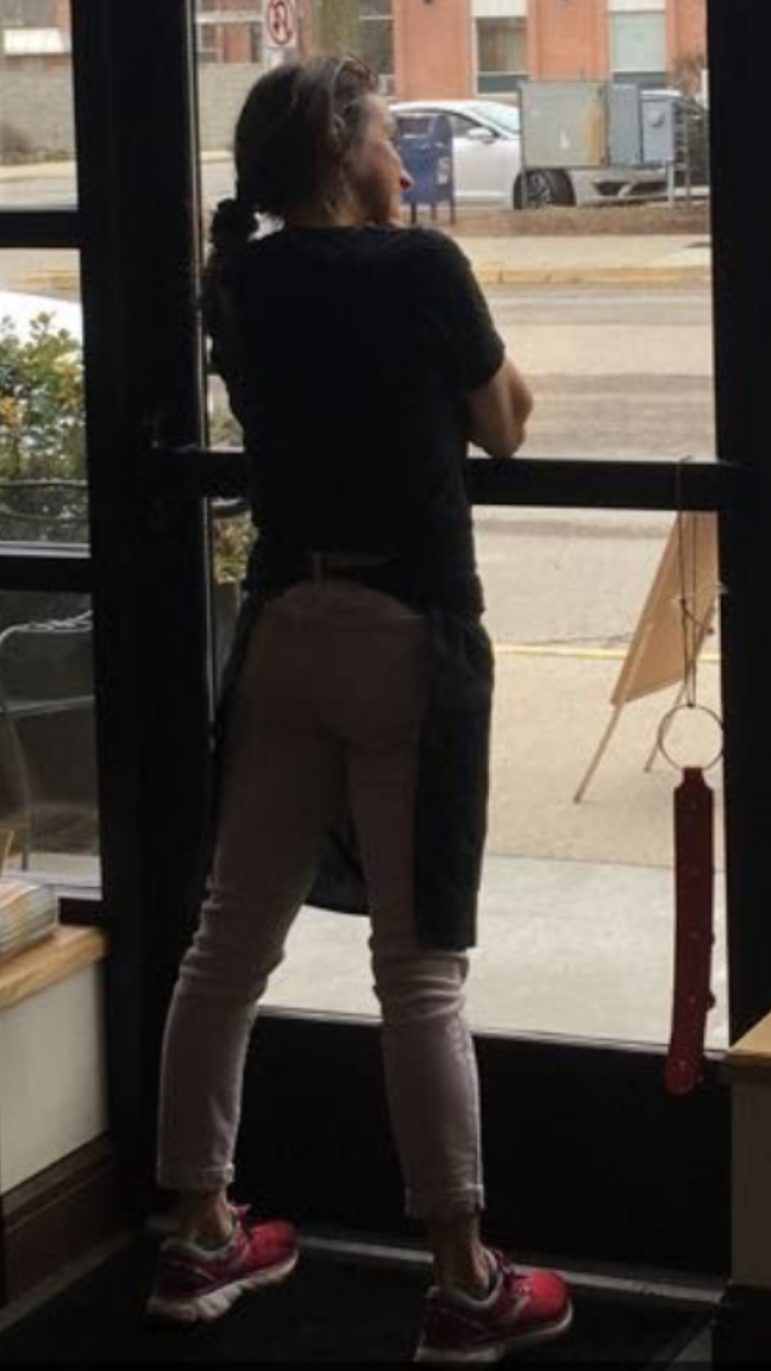
Amy McEwen Goller
Amy McEwen Goller, owner of Brighton Coffeehouse and Theater, waits to see if customers will come in.The coffeehouse doesn’t just sell espressos, teas, sandwiches and more, but it is also a theater.
“We had a production that was up and running and sold out that we had to cancel. Then we had a stand-up comedy showcase that was sold out, it sold out in two hours, and we are having to refund that. I had a show in rehearsal that was supposed to open this weekend that we had to suspend,” McEwen Goller said.
She said that it would be impossible to even think of holding a rehearsal, having her actors 6 feet apart, and that it is a challenge other restaurants don’t have to face.
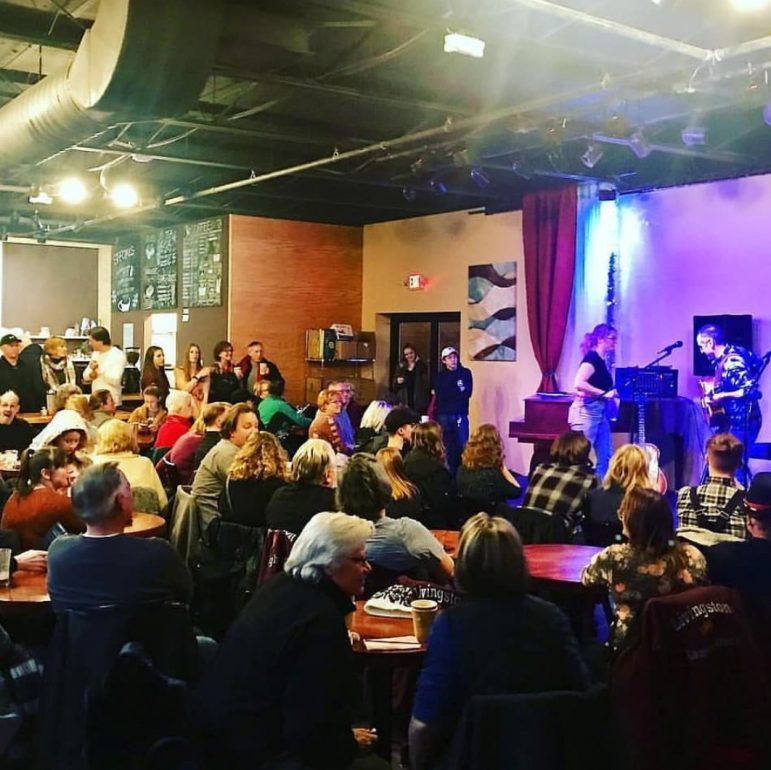
Amy McEwen Goller
The other challenge is how new the coffeehouse is. McEwen Goller has been unable to secure small-business grants because it was decided that grants would only go out to those that have been open for more than five years.
What McEwen-Goller wasn’t expecting was the community support. The first day of shelter in place, Lake Trust Credit Union came into her business and asked her what they can do to help.
“They have worked tirelessly to help us get help and support us. We’ve banked with bankers all over the country for Espresso Royale, and Lake Trust gave us the help and support that I didn’t know was possible,” said McEwen Goller.
Their support, as well as the support from the community of Brighton, is what gives McEwen-Goller hope that her business will be fine at the end of all this.
“We’ve never had an experience like we have in Brighton where our customers are just so supportive and generous. We are definitely going to make it,” said McEwen-Goller.
